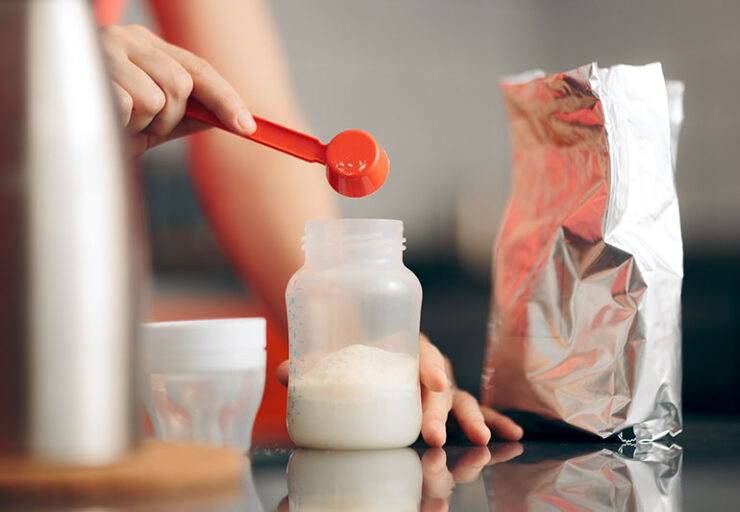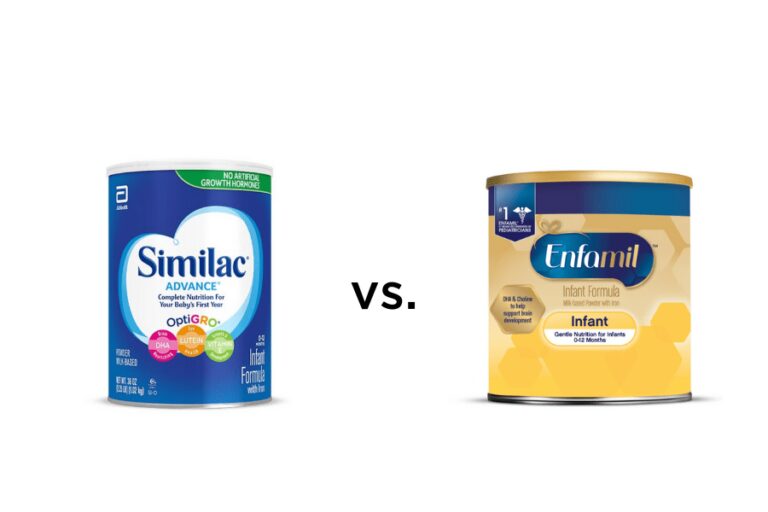Enfamil and Similac are two very popular brands of baby formula. They come in a wide variety of flavors and formulas, but which one is really the best? Which one will give your baby the most nutritious start he could ask for? Is either of them worth their cost? This article will tell you everything you need to know about these two formulas, so you can make the best decision when choosing what’s best for your baby.
What is Baby Formula?

Baby formula is a substitute for breast milk that provides babies with all of their daily nutritional needs. The formula consists of ingredients like corn syrup solids, whey protein, soy oil and more in order to give the nutrients that your baby would otherwise get from breastfeeding or taking in mother’s milk. Making formula at home isn’t too hard either: it just includes mixing together several powders and liquids until they form a substance that closely replicates human breast milk and mimics its nutrient content.
There are several kinds of baby formula out on the market today: some available cheaply at most grocery stores and pharmacies; others available exclusively through medical professionals. Generally, the cheap stuff is not very good for your baby, but if you can’t afford to buy anything more expensive it will do in a pinch. The most important thing to look for when buying ready-made formula is that it contains iron; without iron, babies can become anemic and develop all sorts of health problems related to not getting enough red blood cells.
What are the Benefits of Breastfeeding?

Breast milk provides babies with some amazing benefits. It’s extremely nutritious, containing everything your baby needs for proper growth. It also contains antibodies that help boost your child’s immune system so he isn’t sick as often as other kids who were formula-fed instead of breastfed. Breast milk has also been shown to help fight against certain types of cancer, including leukemia. It can also reduce your child’s risk for heart disease and obesity later in life.
What are the Benefits of Baby Formula?
The formula helps babies who aren’t able to breastfeed grow into healthy children too. Those who are unable to take their mother’s milk usually have an allergic reaction to something found in human milk; it could be a protein or sugar that the baby is intolerant to, it could be an ingredient that upsets his digestive system or causes him pain, or it could simply be that he doesn’t produce enough lactase–the enzyme required to digest dairy products properly.
Baby formula is great for those children who refuse to suckle from the breast. It allows them to get their nutrients without having to actually suckle, which can be very beneficial for mothers of sick children who are unable to breastfeed for whatever reason. For babies whose mothers cannot provide milk but want them to have the benefits that breastfeeding would provide, baby formula is an excellent option.
What are the Disadvantages of Breastfeeding?

Breastfeeding is not always easy or convenient. Babies sometimes reject their mother’s milk on the spot, refusing either all of her milk or parts of it based on what she eats and drinks. Sometimes they aren’t able to latch properly when they first go up to the breast which causes a lot of pain and frustration for both mother and child in a situation where a simple mistake could have easily been avoided if the mother had just given her baby formula instead.
What are the Disadvantages of the Baby Formula?
While there are many endangered species being threatened by extinction due to the sale of human breast milk, there are also several plant and animal kingdoms under threat because people choose baby formula over breastfeeding. Reading this article you will find out that the production of baby formula usually involves harvesting crops like corn, soybeans, wheat, etc., which kills off species of plants or animals living in those areas where these crops are being harvested at unsustainable rates.
As discussed above, using anything other than breast milk can result in anemia for babies–a dangerous condition that could be easily prevented with proper care (although this is not entirely true; see below). Finally, some parents choose not to breastfeed because they simply don’t want to.
Enfamil vs. Similac: Which is the Best Baby Formula?
When it comes to choosing between Enfamil and Similac, there really isn’t a clear-cut winner here. As with most things in life, you get what you pay for–the cheap stuff usually tastes awful and has ingredients that are harmful to developing babies while the expensive brands do exactly the same thing for about fifty cents more per canister or package of powder mixes.
If your child develops anemia after drinking his formula, switch him over immediately to either Enfamil’s Newborn or Gentlease until his body adjusts itself to this new type of milk he is being fed; in most cases, this will happen within three days to a week at the most.
The major differences between Enfamil and Similac are in the taste (Enfamil does not taste as much like milk–it’s actually pretty disgusting) and in the price. If your child is lactose intolerant or sensitive to dairy products of any kind, however, he may have a difficult time digesting either formula without experiencing digestive problems.
Whether you go with an expensive brand name option or a cheaper generic version isn’t going to be of any real consequence when it comes right down to it–the ingredients used will be virtually identical.
The reason why parents get so confused about this issue is that they don’t understand what exactly goes into the baby formula and how that formula can affect their child’s health. So with all that being said, Enfamil vs. Similac? It’s probably best if you just avoid baby formula altogether and stick with breast milk for as long as you can!
Good luck and remember that the most important thing is to take care of your baby–not which brand of baby formula you’re feeding him!

